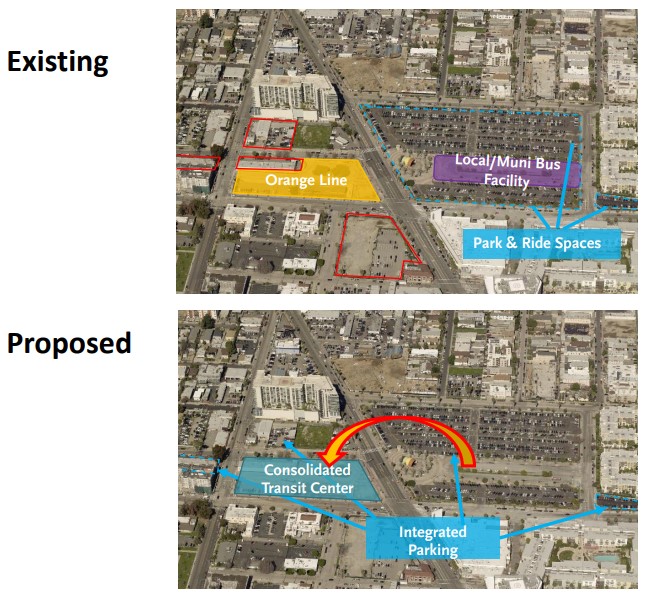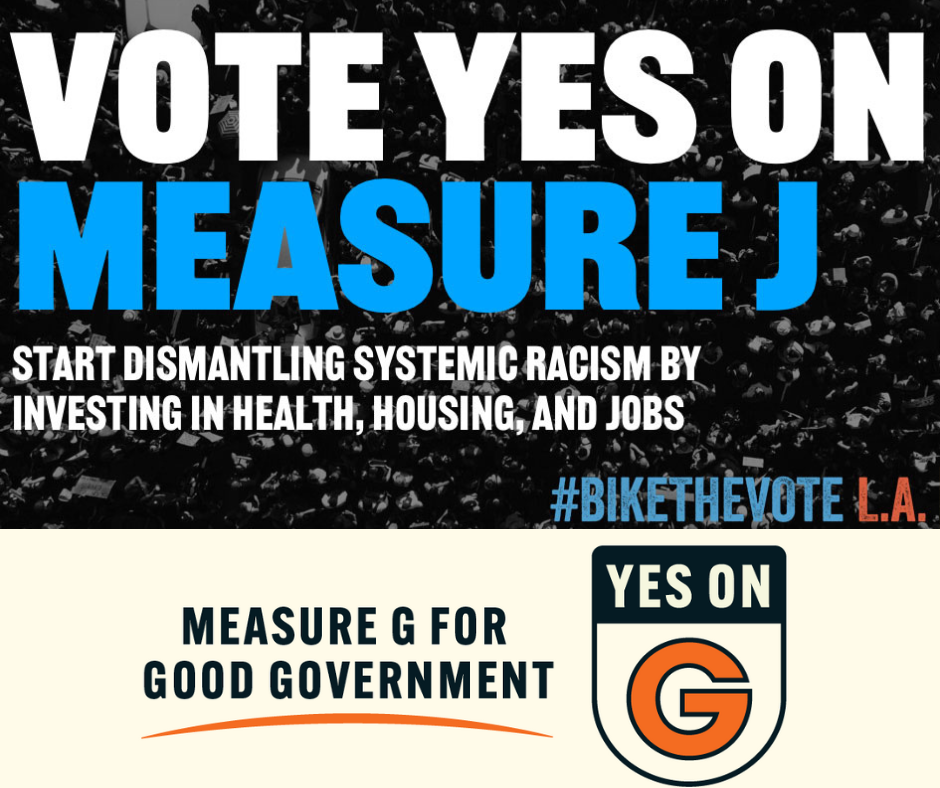This week the Southern California Association of Governments (SCAG - the six-county regional planning agency) announced $80 million in Regional Early Action Planning (REAP) grants awarded to county transportation agencies, including $41.7 million in grants to Metro. Projects funded include bike-share, first-last-mile plans, station improvements, transit signal prioritization, and more.
REAP is an occasional grant program administered by the state's Department of Housing and Community Development (HCD). Overall, REAP grants support housing and climate, specifically including: "[to] accelerate infill housing development, reduce Vehicle Miles Traveled (VMT), increase housing supply at all affordability levels, affirmatively further fair housing (AFFH), and facilitate the implementation of adopted regional and local plans to achieve these goals."
REAP's statewide $352 million, funded by a 2021 state budget surplus, largely passes to Metropolitan Planning Organizations (MPOs) including $237.41 million to SCAG. The first $80 million of that was allocated this week.
In other parts of the state, BART and Sacramento are putting REAP funds toward building transit-oriented housing. Locally the focus appears to be on reducing (or mostly making plans to reduce) VMT. A Metro board box memorandum breaks down Metro's internal project selection process.
Below is a list of L.A. County projects that were funded. Following that is a short listing of funded projects in other southern California counties. For additional information, see also SCAG's press release and Transportation Committee agenda and staff reports.
Los Angeles County REAP Grants:
- North Hollywood Transit Center ($15 million) Metro plans to move the existing NoHo Station bus bays to the west side of Lankershim Boulevard, in order to support the proposed "District NoHo" mixed-use development at the site of the station's current park-and-ride lots. Recent design changes have upped affordable housing, but the project is still saddled with huge costs for Metro "replacement" parking.
- Enhanced GoSGV E-Bike Share Program ($2,6 million) The program expands the San Gabriel Valley GoSGV electric bike-share program run by the SGV Council of Governments and ActiveSGV. Funding will focus on extending the program’s engagement, subsidies, and resources to disadvantaged communities.
- Traffic Reduction Study ($1 million) Back in 2019, Metro started on a one to two year process to develop a plan for a congestion pricing pilot. There have been some mainstream media ridicule, some meetings and some preliminary reports, but (despite this being exactly the right thing for L.A., if done right - especially with regards to equity) it's not clear that Metro has the spine to ever move anywhere near implementing an on-the-ground program.
- First Last Mile Revolution: Transforming Metro Connections to Housing ($1 million) The "revolution/transformation" here is L.A. City doing plans and designs for bike/walk connections to future stations on Metro's Westside Purple Line subway (sections 2 and 3) and East San Fernando Valley light rail.
- Connecting Communities with Stress Free Connections ($5.25 million) L.A. City will design and construct ten Toucan signalized ped/bike crossings in Mid-City West, South L.A., and Central L.A. as envisioned in the city's low-stress network study.
- Metro Bike Share In-fill Expansion ($7.55 million) The project will install new Metro Bike Share stations in Metro Equity Focus Communities filling in a gap between disconnected bike-share areas on the Westside and Downtown/Central Los Angeles.
- Mobility Wallets Pilot 2.0: Challenge and Low-Income ($4 million) Metro will use an integrated wallet of shared transportation to incentivize non-drive-alone trips, apparently similar to the earlier Metro/LADOT pilot.
- Urban Wilderness Access Feasibility Plan ($372,000) Metro will do more transit-to-parks planning, focused on improving circulation to Griffith Park and surrounding parklands in the Hollywood Hills - for riders from disadvantaged communities.
- Countywide Signal Priority Cloud Based Solution ($4 million) Metro will deploy transit signal priority improvements throughout the county.
- Developing Neighborhood Mobility Hub Pilot Projects in Disadvantaged Communities in the South Bay ($404,250) The project develops an implementation plan for Neighborhood Mobility Hub Pilot Projects in South Bay disadvantaged and senior communities. Planned hubs would include micro-transit, and maybe e-bikes, neighborhood electric vehicles, or other options.
Awards in other counties in brief: (see SCAG announcement for detail)
Imperial County REAP Grants:
- Calexico Intermodal Transportation Center ($1 million)
Orange County REAP Grants:
- Next Safe Travels Education Program (STEP) 2.0 ($1.25 million)
- Harbor Boulevard Cloud-Based Transit Signal Priority Stage 1 ($400,000)
- Reconnecting Communities through Complete Streets ($550,000)
- McFadden Avenue Transit Signal Priority Pilot ($3.69 million)
- First Street Multimodal Boulevard Design ($4.3 million)
- Orange County Mobility Hubs Pilot Concept of Operations ($300,000)
- Bikeways Connectivity Study ($500,000)
- Orange County Cyclic [sic] Counts 2024-2025 ($400,000)
- Active Transportation Outreach and Engagement Support ($400,000)
- Fullerton Park and Ride Transit Oriented Development Site Design Concepts ($500,000)
- Harbor Boulevard Cloud-Based Transit Signal Priority Stage II ($1 million)
Riverside County REAP Grants:
- Riverside Transit Agency GoMicro Microtransit Pilot Program Extension ($2.4 million)
- Vehicle Miles Traveled Study ($2 million)
- Riverside County Transportation Commission Core Capacity Innovative Transit Study ($3 million)
- Coachella Rail Station Feasibility Study and Integrated Land Use and Transit Network ($2 miilion)
- Coachella Valley (CV) Link Community Connectors Analysis ($1.7 million)
San Bernardino County REAP Grants:
- San Bernardino County Vehicle Miles Traveled Mitigation Bank ($3 miilion)
- Countywide Multi-Modal Complete Streets Program ($6.5 million)
Ventura County REAP Grants:
- Santa Paula Branch Line Active Transportation – Master Plan Update and Validate Connections to Serve New Housing and Reduce Vehicle Miles Traveled ($1.7 million)
- Community Traffic Calming & Pedestrian and Bicycle Safety Program ($300,000)
- Countywide Transit Stops Inventory & Accessibility Assessment / Capital Improvements Grant Program ($1.5 million)
- Countywide Paratransit Integration Study ($300,000)







